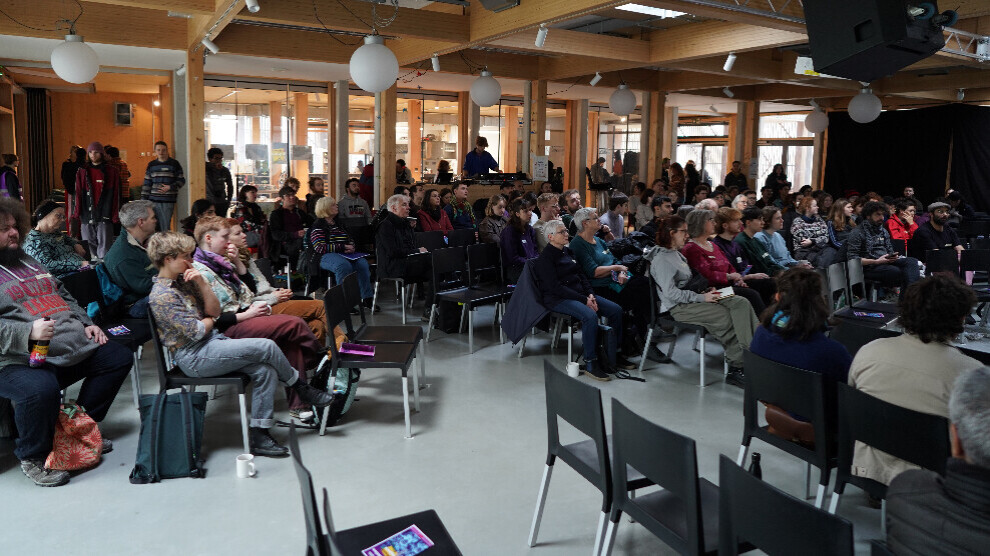Internationalist conference in solidarity with Rojava in Heidelberg
Internationalists met at a solidarity conference in Heidelberg against the invasion and genocidal attacks against Rojava.
Internationalists met at a solidarity conference in Heidelberg against the invasion and genocidal attacks against Rojava.

Hundreds of internationalist revolutionaries gathered in Heidelberg, Germany for a conference on the Turkish state's invasion attacks and massacres against Rojava.
The two-day conference is being organized on January 25-26 under the slogan “Democratic Vision and Perspective in North and East Syria”.
Internationalist revolutionaries highlighted their demand for an immediate end to the Turkish state's attacks on Rojava and status for Kurds in Rojava, Northern and Eastern Syria.
The opening declaration of the conference emphasized that populism and right-wing extremism are on the rise worldwide, wars in the world and in the Rojava region are escalating, and time is running out to fight climate change.
The declaration said the following:
“For more than 12 years, an inspiring experiment based on self-determination, women's liberation, council democracy and multi-ethnic and multi-religious coexistence has been unfolding in North and East Syria. Feminism, solidarity and justice are uniquely alive there. In this two-day conference, we want to examine and discuss this experiment more closely, with all its opportunities and challenges. We prepared this conference before the fall of the Assad regime, and we are surprised and moved by the recent developments in Syria. But we believe that now more than ever it is time to talk about Northern and Eastern Syria and the self-governance structures there. For this reason, this conference will examine and discuss current developments in more detail and will include visions of a democratic future and perspectives on peace and justice.”
The program of the conference is as follows:
SATURDAY
09.30: Opening and welcome
10:00: Introduction: Political situation report:
A look back at 12 years of self-rule and a first-hand assessment of current political events in northern and eastern Syria.
11:00: Overview of women's liberation:
We delve deeper into insights into the theoretical foundations and practical applications of the last 50 years of the Kurdish women's movement. How did this movement emerge and what is it fighting for? What does the anti-patriarchal practice in the movement look like? Why is this a women's revolution in Rojava, and how do the decades of construction work find expression today in North and East Syria? Anja Flach will continue the discussion.
13.00: Lunch break
14:30: Perspectives on Democracy:
What does democracy mean? A keynote speech on the democratic structures in Rojava and the colors and diversity of democratic life forms through this example. The idea of democratic confederalism will be discussed with Müslüm Örtülü.
15:30: Workshops
Daily experiences and stories from Rojava, ecology and climate change, Jineolojî (Women’s Science), transnational media network of the Kurdish freedom movement, decolonization, oppression of Kurds in Germany, femicide, war - perspectives from the Rojava region and beyond will be self-critically and lively discussed with experiences from various think tanks. Participating guests include Ayten Kaplan, Alexander Glasner-Hummel, Kerem Schamberger, Leonie Baumgarten, Egemole, Ercan Ayboga, Anja Flach, Jineolojî Network Germany.
17:00: Break
17.30: Peace Perspectives:
Salih Muslim, the leading representative of the Democratic Society Movement (TEV-DEM) and one of the main voices of Rojava, will join the conference via video call. He will give a first-hand account of the developments, challenges and visions in northern and eastern Syria.
A panel discussion with guests from Germany and Kurdistan will focus on war and peace. What is the situation after the fall of the Assad regime? Who are the actors in the current conflict and what interests do they pursue? What is Germany's role and responsibility? And above all: How can solidarity with the civilian population succeed? What is needed for peace and what are the prospects for a democratic solution? Participating guests; Leyla Imret, MP Max Lucks, MP Gökay Akbulut and Sara Spikehaus.
19:30: Break
SUNDAY
10:00: Security perspective:
Prof. Dr. Michael Haus from Heidelberg University will lead a discussion on creating democratic structures.
11.00: Security in Rojava:
How is security organized in a war-torn region with an insight into the reality in Rojava? What structures exist to achieve self-governance and, if possible, non-violent structures? Thinking about new ways to achieve peace, justice and security. (A live broadcast with a member of the Asayish from the Autonomous Administration of North and East Syria).
12:30: Conclusion